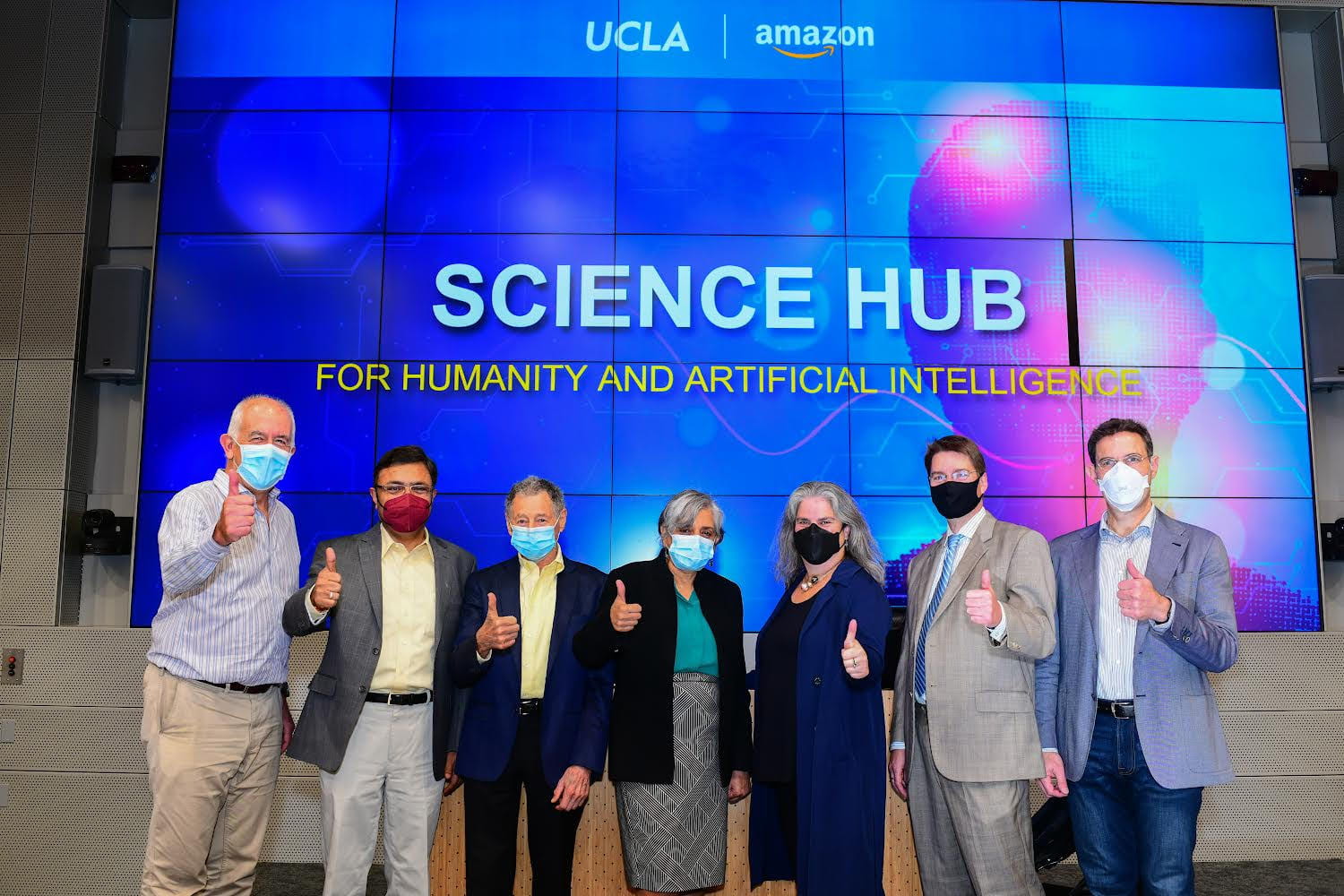Science Hub
for Humanity and Artificial Intelligence
The mission of the science hub is to address humanity’s pressing challenges by cross-pollinating academic and industry research that harnesses the power of artificial intelligence.


UCLA
At a kickoff event on the anniversary of the birth of the internet, speakers included Pietro Perona and Prem Natarajan of Amazon, and Leonard Kleinrock, Jayathi Murthy, Andrea Ghez, Jens Palsberg and Stefano Soatto of UCLA.
UCLA and Amazon Join Forces to Create Science Hub for Humanity and Artificial Intelligence
Christine Wei-li Lee |
Amazon and UCLA have collaborated to establish the Science Hub for Humanity and Artificial Intelligence, marking the technology company’s first such alliance with a public university.
Based at the UCLA Samueli School of Engineering, the research hub will aim to leverage the cross-pollination of industry and academic research on artificial intelligence to address society’s most pressing challenges and develop solutions that will ultimately benefit humanity. The collaboration will support doctoral fellowships, research projects and community outreach programs.
Amazon will provide $1 million in funding for the initial year of the relationship and the parties may renew the agreement for up to four additional years. The hub will engage Amazon AI specialists and faculty from across the UCLA campus to jointly identify and solve research problems, with particular attention to issues of bias, fairness, accountability and responsible AI.
“We are delighted to collaborate with Amazon on this effort to examine the future of artificial intelligence and its implications for our world,” UCLA Chancellor Gene Block said. “The Science Hub for Humanity and Artificial Intelligence will advance AI-related discoveries and deepen our understanding of a discipline that is revolutionizing the way we use and understand modern technology.”
To celebrate the launch of the hub, UCLA Engineering today held “Amazon Science Day at UCLA,” an event that coincided with the 52nd anniversary of the birth of the internet. On Oct. 29, 1969, UCLA computer science professor Leonard Kleinrock directed the transmission of the first internet message from his lab in UCLA’s Boelter Hall to the Stanford Research Institute. Kleinrock, now a UCLA distinguished professor of computer science, has received numerous prestigious honors for his foundational contributions to the development of the internet.
The daylong program featured speakers from both institutions including Kleinrock; UCLA astrophysicist Andrea Ghez, winner of the 2020 Nobel Prize in physics; Jayathi Murthy, the Ronald and Valerie Sugar Dean of UCLA Engineering; and Stefano Soatto, vice president of applied sciences for Amazon Web Services AI and a UCLA professor of computer science. Soatto, currently on leave from his UCLA faculty position, was instrumental in helping Amazon and UCLA establish the collaboration.
Several other top executives from Amazon attended the event, including Prem Natarajan, Alexa AI vice president of Natural Understanding; Gerard Medioni, vice president and distinguished scientist; and Pietro Perona, Amazon Fellow for AWS Deep Learning.
“Amazon has long been at the forefront of AI breakthroughs, and we are incredibly excited to be working with them,” Murthy said. “We will strive to harness the power of AI for the greater good and to provide myriad opportunities for students and faculty alike.”
The hub will support AI research by faculty and students across campus through an advisory group headed by Jens Palsberg, a UCLA professor of computer science. Composed of representatives from both UCLA and Amazon, the group will develop, solicit and select research proposals, and review nominations for fellowship recipients.
Funding for the hub will also include annual fellowships of $70,000 each for students in the second, third or fourth year of a UCLA Engineering doctoral program. As Amazon Fellows, they will be invited to take part in paid summer internships at the company.
In an effort to expand access to AI research, the hub will support community and outreach activities, such as public symposiums and workshops designed to facilitate networking across the Los Angeles metro area, and collaboration between UCLA and Amazon researchers.
“The hub is designed to foster the educational mission of the university, so it can best educate the diverse talent needed to sustain the AI revolution in the years to come, in a way that benefits all sectors of society,” Soatto said. “It will also create opportunities for university researchers, by exposing them to challenging unsolved problems that arise in the diverse array of Amazon businesses.
“These collaborations with Amazon scientists can lead to new avenues of academic investigation that expand their research scope. The hub is also designed to enable faculty who think big to realize their vision, if it is not attainable within the resources of their labs.”
The Science Hub for Humanity and Artificial Intelligence represents an extension of Amazon’s long-held commitment to connecting with universities to advance research in AI and other fields. The hub also underscores Amazon’s and UCLA’s shared vision of improving access to AI technologies and diversifying the perspectives and practices involved in AI research and technology development.
The agreement was facilitated by the UCLA Technology Development Group.
The collaboration builds upon Amazon’s existing relationships with several UCLA professors, in addition to Soatto. Ying Nian Wu, a professor of statistics, joined Amazon as a scholar in November 2020, and Yizhou Sun, an associate professor of computer science, joined as a scholar in June. Additionally, UCLA computer science assistant professors Cho-Jui Hsieh, Kai-Wei Chang and Violet Peng are Amazon visiting academics.
“The hub is designed to foster the educational mission of the university, so it can best educate the diverse talent needed to sustain the AI revolution in the years to come, in a way that benefits all sectors of society.”
Media Contact
Christine Wei-li Lee
310-206-0540
clee@seas.ucla.edu
